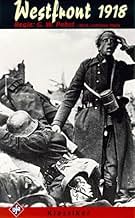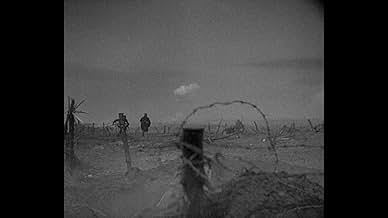Quatre de l'infanterie
- 1930
- Tous publics
- 1h 15min
Un groupe de soldats allemands de la Première Guerre mondiale vit dans les tranchées en France. Karl, l'un d'eux, rentre chez lui en permission et découvre la pauvreté à laquelle sa famille ... Tout lireUn groupe de soldats allemands de la Première Guerre mondiale vit dans les tranchées en France. Karl, l'un d'eux, rentre chez lui en permission et découvre la pauvreté à laquelle sa famille a été confrontée mais doit retourner au front.Un groupe de soldats allemands de la Première Guerre mondiale vit dans les tranchées en France. Karl, l'un d'eux, rentre chez lui en permission et découvre la pauvreté à laquelle sa famille a été confrontée mais doit retourner au front.
- Réalisation
- Scénario
- Casting principal
- Récompenses
- 1 victoire au total
- Der Student
- (as H.J. Moebis)
- Undetermined Secdondary Role
- (non crédité)
- Hamburger
- (non crédité)
- Undetermined Secondary Role
- (non crédité)
- Meal Orderly
- (non crédité)
- Undetermined Secondary Role
- (non crédité)
- Undetermined Secondary Role
- (non crédité)
Avis à la une
The framing, editing and visual quality are adept, as one would expect from Pabst, if not from an early sound film. I especially liked the framing and fluidity of the staircase goodbye. There's a surveying moving camera, as there is in "All Quiet on the Western Front". The long battle sequence at the end is the climax of the salient film-making. There is a very long take from an unmoving position, as if the camera were a hidden soldier observing; it is unexciting, yet my attention was not discouraged.
This film transcends the limitations of the sensibilities of the time and the special effects available to movie makers. It makes no sweeping statements or judgments about war and aggression. It simply gives you a glimpse of what it was like to live and die in the trenches of The Great War.
Although not as intense as "All Quiet on the Western Front" (whose subject matter it shares), it has its moments of artistry. It is also more narrowly focused than "All Quiet..", but its story is compelling and riveting. Should be in anybody's serious list of worthy war movies.
This makes for an interesting companion piece to this same year's All Quiet on the Western Front. This movie is a bit rawer, with some minor fondling and cursing that wouldn't have made it into a US film, even during the pre-code era. The performances are all good, and I especially liked the turn by Clausen as an intense lieutenant in over his head. There's a section in a beerhall with a USO-type show featuring musicians, a raunchy singer, and a clown, that goes on a bit too long. The last 15 minutes or so are some of the most devastating war scenes in film. Highly recommended. .
I have to say though, the impact of it all was a little lessened because the images and concepts weren't as novel for me 90 years later, as unfair to the film as that might be. It lags as well when it's off the battlefield, showing among other things an uninteresting (and long) performance at a canteen, and the confrontation with the wife in bed with another man. I think it was trying to balance out the warfare and build up characters so that we were invested in them, but I struggled to stay interested (this and the bleakness of the thing make it one I wouldn't reach for again). Kudos to Pabst for making it, and I loved the way he closes it with "The End?!", certainly well aware of growing militarism and possibility for another devastating war.
Le saviez-vous
- AnecdotesThis film was banned by the Nazis after they came into power in Germany in 1933.
- GaffesThe depth of the trenches is inaccurate. In several scenes where the soldiers are standing up, their heads are higher than the top of the trench, making them easy targets for snipers and also allowing the French to monitor troop movements.
- Citations
Woman in rationed food line: What are you doing? Back of the line!
Another Woman in rationed food line: What's wrong with the old cow? Cutting in line!
Man in rationed food line: Leave the woman alone.
Woman cutting in rationed food line: My Adolf is dead.
Woman in rationed food line: Think you're the only one? That's no reason to cut in line. Go to the back!
- ConnexionsEdited into A Hellish Chaos (2017)
Meilleurs choix
- How long is Westfront 1918?Alimenté par Alexa
Détails
- Date de sortie
- Pays d’origine
- Langues
- Aussi connu sous le nom de
- Westfront 1918
- Lieux de tournage
- Sociétés de production
- Voir plus de crédits d'entreprise sur IMDbPro
- Durée
- 1h 15min(75 min)
- Couleur
- Rapport de forme
- 1.20 : 1





























